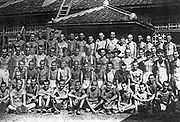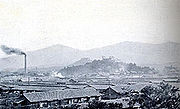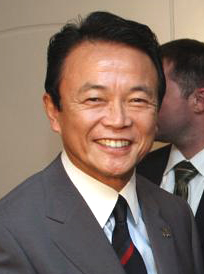
Aso Mining forced labor controversy
Encyclopedia

Allies of World War II
The Allies of World War II were the countries that opposed the Axis powers during the Second World War . Former Axis states contributing to the Allied victory are not considered Allied states...
prisoners of war
Prisoner of war
A prisoner of war or enemy prisoner of war is a person, whether civilian or combatant, who is held in custody by an enemy power during or immediately after an armed conflict...
(POW) and Korea
Korea
Korea ) is an East Asian geographic region that is currently divided into two separate sovereign states — North Korea and South Korea. Located on the Korean Peninsula, Korea is bordered by the People's Republic of China to the northwest, Russia to the northeast, and is separated from Japan to the...
n conscripts as laborers for the Aso Mining Company in Japan
Japan
Japan is an island nation in East Asia. Located in the Pacific Ocean, it lies to the east of the Sea of Japan, China, North Korea, South Korea and Russia, stretching from the Sea of Okhotsk in the north to the East China Sea and Taiwan in the south...
during World War II
World War II
World War II, or the Second World War , was a global conflict lasting from 1939 to 1945, involving most of the world's nations—including all of the great powers—eventually forming two opposing military alliances: the Allies and the Axis...
. Surviving laborers and other records confirmed that the prisoners and conscripts were forced to work in harsh, brutal conditions for little-to-no pay and that some died, at least in part, because of the ill-treatment at the mine.
Although reported by Western media sources, former Prime Minister of Japan
Prime Minister of Japan
The is the head of government of Japan. He is appointed by the Emperor of Japan after being designated by the Diet from among its members, and must enjoy the confidence of the House of Representatives to remain in office...
Taro Aso
Taro Aso
was the 92nd Prime Minister of Japan serving from September 2008 to September 2009, and was defeated in the August 2009 election.He has served in the House of Representatives since 1979. He was Minister for Foreign Affairs from 2005 to 2007, and was Secretary-General of the LDP briefly in 2007 and...
, whose immediate family owns the company, now called the Aso Group, repeatedly refused to confirm that his family's company had used forced labor until 2009 when it was acknowledged by the Japanese government. Since then, several surviving former Australian POWs have asked Aso and the company to apologize, but both have declined to do so.
Denials
In mid-2008 Taro Aso conceded that his family's coal mine, Aso Mining Company, was alleged to have forced Allied POWs to work in the mines in 1945 without pay. Western media had reported that 300 prisoners, including 197 AustraliaAustralia
Australia , officially the Commonwealth of Australia, is a country in the Southern Hemisphere comprising the mainland of the Australian continent, the island of Tasmania, and numerous smaller islands in the Indian and Pacific Oceans. It is the world's sixth-largest country by total area...
ns, 101 British
United Kingdom
The United Kingdom of Great Britain and Northern IrelandIn the United Kingdom and Dependencies, other languages have been officially recognised as legitimate autochthonous languages under the European Charter for Regional or Minority Languages...
, and two Dutch
Netherlands
The Netherlands is a constituent country of the Kingdom of the Netherlands, located mainly in North-West Europe and with several islands in the Caribbean. Mainland Netherlands borders the North Sea to the north and west, Belgium to the south, and Germany to the east, and shares maritime borders...
, worked in the mine. Two of the Australians, John Watson and Leslie Edgar George Wilkie, died while working in the Aso mine. In addition, 10,000 Korean conscripts worked in the mine between 1939 and 1945 under severe, brutal conditions in which many of them died or were injured while receiving little pay. Apart from Aso's admission, the Aso company has never acknowledged using forced labor or commented on the issue. The company, now known as the Aso Group, is currently run by Aso's younger brother. Aso's wife serves on its board of directors
Board of directors
A board of directors is a body of elected or appointed members who jointly oversee the activities of a company or organization. Other names include board of governors, board of managers, board of regents, board of trustees, and board of visitors...
. Taro Aso was president of the Aso Mining Company's successor, Aso Cement Company, in the 1970s before entering politics.

Ministry of Foreign Affairs (Japan)
The is a cabinet level ministry of Japan responsible for the country's foreign relations.The ministry is due to the second term of the third article of the National Government Organization Act , and the Ministry of Foreign Affairs Establishment Act establishes the ministry...
, the ministry refused to confirm non-Japanese accounts of the use of forced labor by Japanese companies and challenged non-Japanese journalists to back-up their claims with evidence. In October 2008, Diet
Diet of Japan
The is Japan's bicameral legislature. It is composed of a lower house, called the House of Representatives, and an upper house, called the House of Councillors. Both houses of the Diet are directly elected under a parallel voting system. In addition to passing laws, the Diet is formally...
member Shoukichi Kina
Shoukichi Kina
, born June 10, 1948 in Koza , Okinawa, is an Okinawan rock musician who, along with his band Champloose, played a large role in the Japanese home-grown "folk rock" scene in the 70s and 80s. His first big hit was "Haisai Ojisan" in 1972, which he wrote when he was in high school...
asked Aso whether any data about the use of Korean labor by Aso Mining had been provided to the South Korean government, which has requested such data. Aso replied that his administration would not disclose how individual corporations have responded to Korean inquiries.
On November 13, 2008, during a discussion in the Upper House Committee on Foreign Affairs and Defense about the Tamogami essay controversy
Toshio Tamogami
was the chief of staff of Japan's Air Self-Defense Force from March 2007 to November 2008.-Career and retirement:Tamogami was dismissed with a 60 million yen allowance due to an essay he published on October 31, 2008, arguing that "it is a false accusation to say was an aggressor nation" during...
, Aso refused to confirm that forced labor had been used at his family's mine, stating that, "No facts have been confirmed." Aso added that, "I was 4, maybe 5 at the time. I was too young to recognize anything at that age." After Yukihisa Fujita
Yukihisa Fujita
is a Japanese politician of the Democratic Party of Japan , a member of the House of Councillors, the upper house of Japan's parliament, from the Ibaraki constituency. In the House of Councillors he is the Chair of the Committee on Financial Affairs...
responded that records at the United States National Archives and Records Administration
National Archives and Records Administration
The National Archives and Records Administration is an independent agency of the United States government charged with preserving and documenting government and historical records and with increasing public access to those documents, which comprise the National Archives...
indicated that forced labor had taken place at his family's mine, Aso repeated that "no factual details have been confirmed."
Admission and requests for apology

In February 2009, Fujita announced that he had interviewed three of the former Australian POWs forced to work at Aso Mining. All three confirmed that working conditions at the mine were terrible, that they were given little food, and were given "rags" to wear. The three veterans sent letters to Taro Aso demanding an apology for their treatment at Aso Mining and for refusing to acknowledge that forced POW labor was used by his family's company. The three also requested that the company pay them wages for the hours they worked. Fujita stated that Aso needed to apologize to the former laborers, as well as pay their wages if he cannot prove that money was paid, adding, "As a prime minister of a nation who represents the country, Aso needs to take responsibility for the past as well as the future." Later that month, Aso conceded that his family's mine had used POW labor.
In June 2009, former POW Joseph Coombs and the son of another, James McAnulty, traveled to Japan to personally seek an apology from Aso. Said Coombs, "We'd like an apology for the brutal treatment and the conditions we had to work under. The memory will always be there, but an apology will help ease some of the pain that we experienced." Aso Group officials met with Coombs and McAnulty, but declined to acknowledge that they had been forced to work for the company and apologize or offer compensation, even after Coombs and McAnulty showed the officials company records from 1946 which stated that POW labor had been used in the mine. Taro Aso refused to meet the pair.

